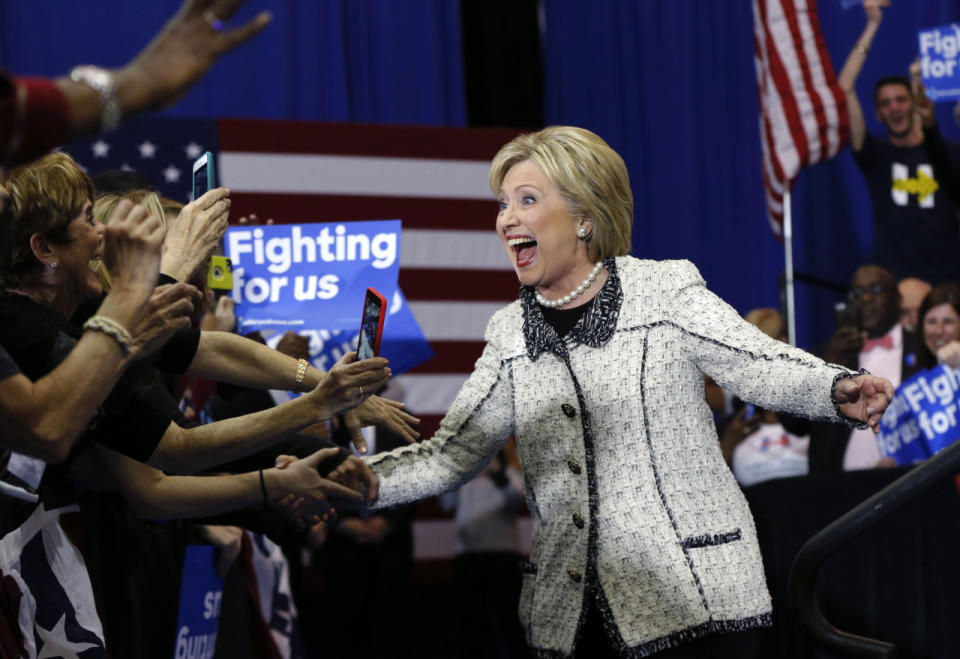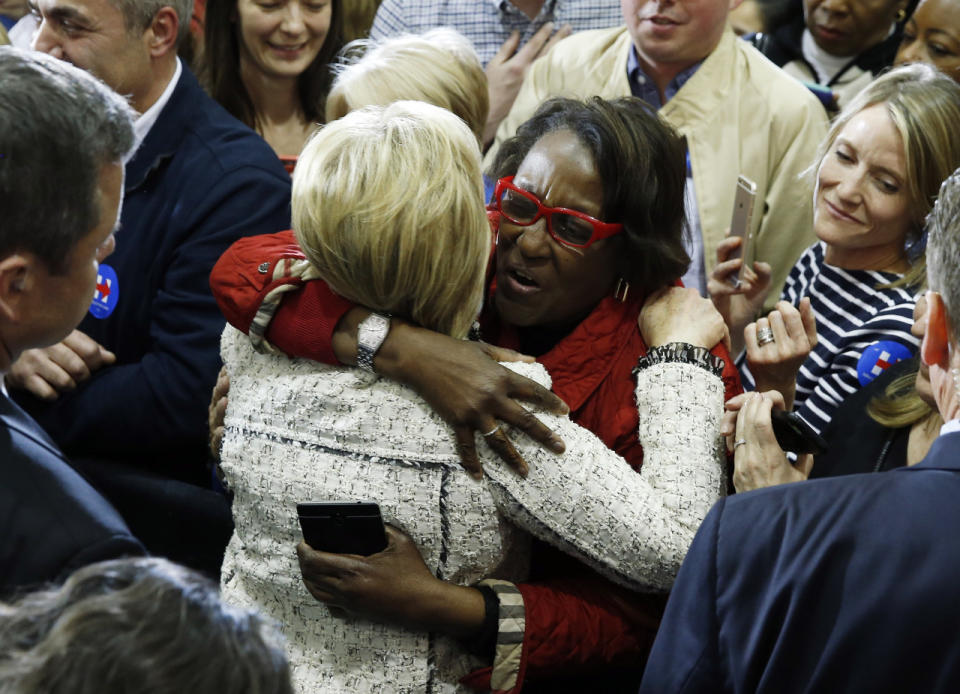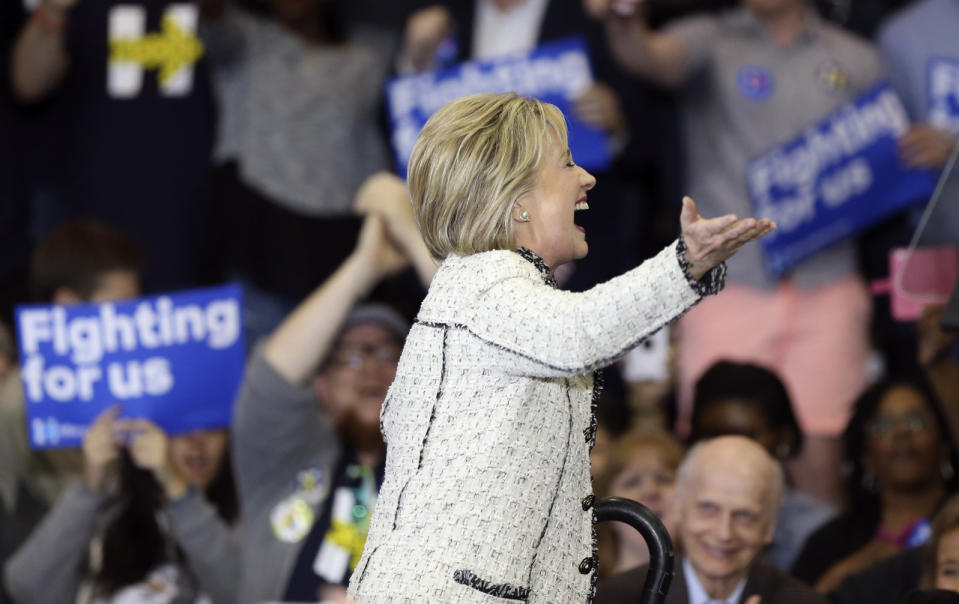Hillary Clinton wins South Carolina as Bernie Sanders flops with black voters
COLUMBIA, S.C. — Hillary Clinton trounced her rival Bernie Sanders in South Carolina Saturday, her second decisive win in a week as she heads into Super Tuesday.
“Tomorrow, this campaign goes national,” Clinton said to a fired-up crowd at the volleyball court in the University of South Carolina.
Her speech was largely aimed at GOP frontrunner Donald Trump, as if she were already the nominee making a general election pitch. “We don’t need to make America great again. America never stopped being great,” she said. “Instead of building walls, we need to be tearing down barriers.”
She quoted Scripture and asked for more “love and kindness,” setting up a sharp contrast to Trump.
The win dims Sanders’ prospects but at the same time makes it even more urgent for Clinton to appeal to his supporters, a passionate part of the Democratic base she can ill afford to alienate before the general election.
Clinton campaigned hard in the state, drawing large, mostly African-American crowds to town halls and rallies across South Carolina. (ABC exit polling showed that Clinton won 84 percent of the black vote.) She stressed her personal commitment to the state, which she first visited as a young lawyer fighting against a system that sent juveniles to adult jails, and slammed Sanders on gun control in particular. She campaigned with African-American mothers whose children were killed by police or in incidents of gun violence, and made reforming the criminal justice system and ending “systemic racism” a centerpiece of her stump speech.
Her high-profile surrogates also made the case that Sanders’ courting of the black vote was driven by political necessity — flipping the script on the insurgent candidate who has run on his authenticity.

Hillary Clinton greets supporters at her election night party for the South Carolina Democratic primary on Saturday. (Photo: Gerald Herbert/AP)
Slideshow: Clinton wins big in South Carolina >>>
“Don’t you come to my communities, talk about how much you care, talk your passion for criminal justice, and then I don’t hear from you after an election. And I didn’t hear from you before the election,” Sen. Cory Booker of New Jersey told a group of mostly black voters who gathered in a Methodist church in Florence to hear Clinton speak Thursday.
In a statement, Sanders congratulated Clinton on her win but said the race was far from over. “This campaign is just beginning,” he said. “We won a decisive victory in New Hampshire. She won a decisive victory in South Carolina. Now it’s on to Super Tuesday.”
Sanders, surging after a big win in New Hampshire, hit a wall in this state, where exit polls suggested more than 60 percent of the Democratic primary voters were black. Despite outreach attempts and the testimony of African-American surrogates who crisscrossed South Carolina on his behalf, Sanders did not make significant inroads with black voters here. At a muted rally Friday night in Columbia, the Vermonter remained confident. “I’m going to need your help the day after the general election,” Sanders told the mostly white crowd of a couple of hundred supporters.
His campaign team has long been prepared for the possibility that Sanders would lose in Nevada and Southern states, where Clinton has stronger minority support. But they like his chances in Super Tuesday states such as Colorado, Massachusetts and Sanders’ home state of Vermont. Sanders left South Carolina on Saturday morning for rallies in Texas and Minnesota, which both vote Tuesday. Still, in order to catch up to Clinton’s delegate count, Sanders would have to win by wider margins in these states than polling shows he’s getting.

Clinton hugs a supporter during a primary night party in Columbia, S.C. (Photo: Jonathan Ernst/Reuters)
If Clinton keeps amassing delegates and Sanders is forced to concede this spring, the former secretary of state faces the daunting task of drawing Sanders’ supporters to her without pivoting so far to the left that she alienates moderate Democrats in the general election. Clinton has had trouble attracting white men and younger voters. President Obama was reelected in 2012 with just 39 percent of the white vote, which has presented a new path to the presidency driven by galvanizing minority communities. Still, Sanders has attracted a disproportionate share of young voters, a demographic Clinton has acknowledged she needs to win over.
On Thursday, a high school senior asked Clinton what she would do to ignite the same kind of “fire” in young voters that Sanders has, suggesting that she start a youth advisory council and appoint him to it.
“I want to … get all your information,” Clinton said. “Your suggestion is a very good one.” Clinton added that she knows many young people are supporting Sanders and called millennials “one of the most generous, tolerant, connected generations in human history.”
“I know they may not be for me now, but I’ll be for them always,” she said, a line she’s repeated several times.
Clinton spokeswoman Jennifer Palmieri said earlier Thursday that Clinton wants Sanders’ voters to get to know her better and believes she can talk them over to her side with time.
“We just refuse to accept that we can’t convince them,” Palmieri said of Sanders’ supporters, particularly the young ones. “He has very committed supporters, and we respect that. … These are people that are engaged enough to care. [Clinton] was one of those people.
“She wants them to know her better,” she said.
But some hardcore Sanders supporters, who label themselves “Bernie or Bust,” said they would rather sit out the general election than cast their vote for Clinton.
Shawn Crowe, a 49-year-old Columbia native who works on refrigeration equipment, said he was a lifelong Republican until 2012, when he became disillusioned with how the party treated Ron Paul. He threw his support behind Sanders last May.

Clinton supporters in Columbia, S.C., cheer as the networks project her as the winner of the South Carolina primary. (Photo: Randall Hill/Reuters)
If Clinton wins the nomination, he won’t vote for her for president.
“That’s not really for partisan reasons. I just don’t trust her,” he said at a rally for Sanders in Columbia. “There’s going to be a lot of people [like me]. We call them ‘Bernie or Bust’ people. I’m one of them. I don’t have a plan B.”
The rapper Killer Mike, a Sanders surrogate, said he hadn’t made up his mind what he would do if Clinton runs against a Republican.
“To be honest with you, I don’t know,” he said while at a campaign stop at the Phlayva barbershop. “Because I just don’t support oligarchies. I don’t wish to vote for another Clinton or Bush.”
Others at the Sanders rally said they’d hold their nose and vote for Clinton. “I wouldn’t really want to, but I’d have to,” said Anna Mesa, 22. “I don’t trust her.”
Still, some Sanders supporters have already made the jump, hoping to get the party united around one nominee to have a better shot at beating whomever the Republicans put up.
Columbia resident James Anthony was persuaded to shift his support from Sanders to Clinton by his friend Carole Benson. “She told me that a vote for Bernie is a vote for Trump,” Anthony said at a rally for Clinton Thursday night. “I love his ideas, I love the idealism. But it’s not doable.”

Clinton with supporters at a South Carolina primary night party. (Photo: Randall Hill/Reuters)


